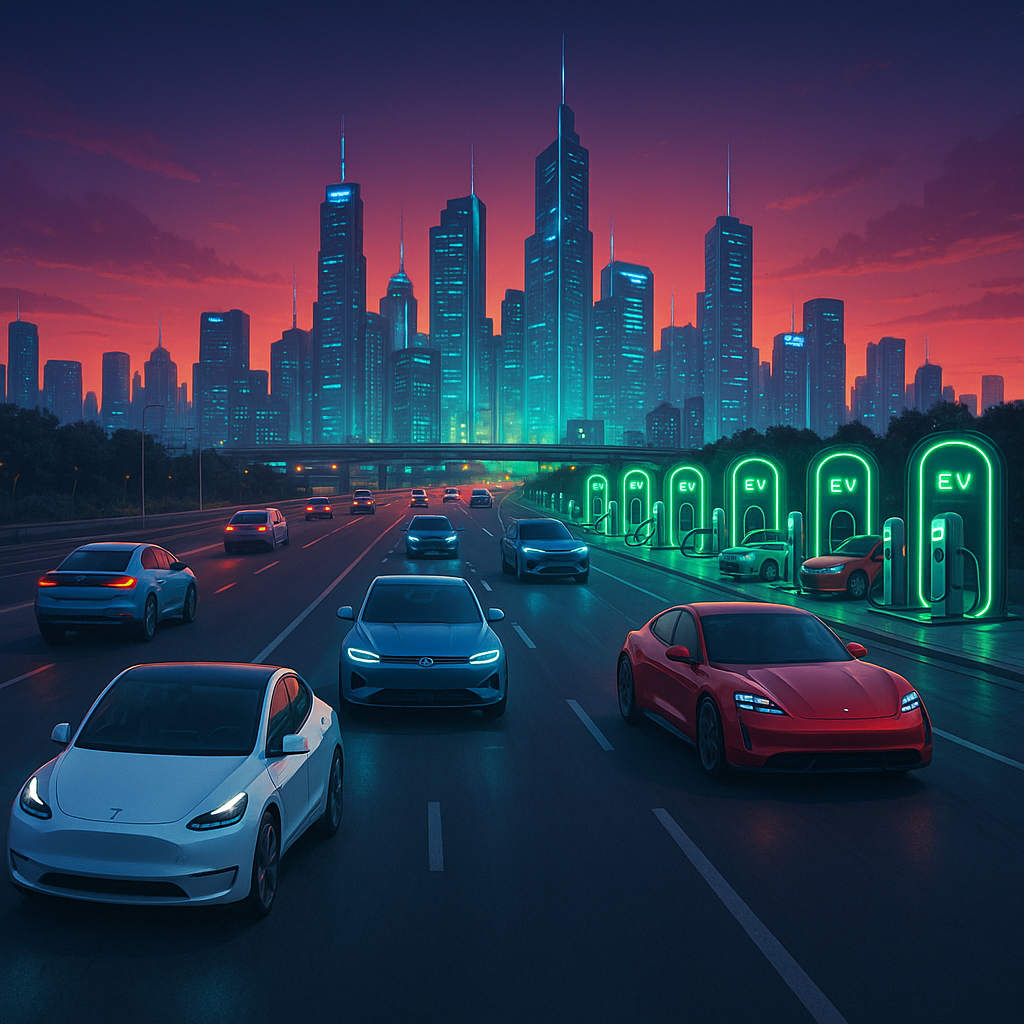“The future of mobility is not just electric — it’s smart, luxurious, and globally accessible.”
🌍 Introduction: EVs in the Fast Lane
The automotive industry is experiencing its biggest shift since the gasoline engine. EVs are no longer niche; they are mainstream, driven by:
- Government incentives
- Rapid battery improvements
- Expanding charging networks
- Consumer demand for sustainable innovation
In 2025, some brands aren’t just adapting — they’re shaping the future of mobility. From Tesla’s global dominance to Lucid‘s luxury breakthroughs and BYD‘s mass-market expansion, here are the Top 10 Electric Vehicle Brands in 2025.
🔋 1. Tesla – The Trailblazer
- Founded: 2003 (USA)
- Flagships: Model 3, Model Y, Cybertruck, Semi
- Why It Leads:
- Defined the modern EV industry.
- Still leads in range, performance, and innovation.
- Supercharger network remains the gold standard.
- Investor Insight: Holds ~15–20% of the global EV market.
🌏 2. BYD (Build Your Dreams) – The Chinese Giant
- Founded: 1995 (China)
- Flagships: Dolphin, Seal, Han, Atto 3
- Why It Leads:
- Surpassed Tesla in sales in 2023.
- Pioneered the Blade Battery for safer, efficient EVs.
- Expanding rapidly into Europe & Middle East.
🚘 3. Hyundai Motor Group (Hyundai + Kia) – The Tech Challenger
- Founded: 1967 (South Korea)
- Flagships: Hyundai Ioniq 5 & 6, Kia EV6, Kia EV9
- Why It Leads:
- Ultra-fast 800V charging platform.
- Award-winning futuristic designs.
- Aggressive pricing + advanced features.
🇩🇪 4. Volkswagen Group – The Global Legacy Giant
- Founded: 1937 (Germany)
- Flagships: VW ID.3, ID.4, Audi e-tron, Porsche Taycan
- Why It Leads:
- Billions invested in electrification.
- Multi-brand approach (VW, Audi, Porsche, Skoda).
- Strong in Europe & China.
💎 5. Lucid Motors – The Luxury Range King
- Founded: 2007 (USA)
- Flagships: Lucid Air, Lucid Gravity SUV
- Why It Leads:
- Market-leading 500+ miles of range (Lucid Air Dream Edition).
- Ultra-luxury interiors rivaling Mercedes EQS.
- Backed by Saudi investment for global growth.
🏎 6. Porsche – Performance Electrified
- Founded: 1931 (Germany)
- Flagships: Taycan, Macan EV
- Why It Leads:
- Combines heritage sports performance with modern electrification.
- Appeals to premium sports car enthusiasts.
🚚 7. Rivian – The Adventure Brand
- Founded: 2009 (USA)
- Flagships: R1T pickup, R1S SUV, Amazon delivery vans
- Why It Leads:
- First to launch a mass-market electric pickup.
- Targets adventure & fleet markets.
- Strong Amazon partnership.
❄️ 8. Polestar – Scandinavian Minimalism
- Founded: 2017 (Sweden/China, Volvo + Geely)
- Flagships: Polestar 2, Polestar 3, Polestar 4
- Why It Leads:
- Distinctive minimalist design.
- Combines European safety with modern tech.
- A stylish alternative to Tesla.
🔄 9. NIO – The Battery Swap Pioneer
- Founded: 2014 (China)
- Flagships: ET7, ES6, ES8
- Why It Leads:
- Battery swapping stations replace batteries in 5 minutes.
- AI-enhanced interiors and premium positioning.
- Expanding beyond China into Europe.
🇮🇳 10. Tata Motors – Emerging Market Champion
- Founded: 1945 (India)
- Flagships: Nexon EV, Punch EV, Tigor EV
- Why It Leads:
- Affordable EV leader in India.
- Supported by Tata Group’s ecosystem (batteries, infrastructure).
- Expanding EV adoption in price-sensitive markets.
📊 EV Market Snapshot in 2025
- Tesla & BYD → Global market leaders (~35% share).
- Hyundai/Kia & VW Group → Fast-growing challengers.
- Lucid, Porsche, Polestar → Luxury & design innovators.
- Rivian & NIO → Niche disruptors (pickups + battery swap).
- Tata Motors → Emerging market democratizer.
🚀 Future Outlook
The second half of the decade will bring:
- Solid-state batteries → Longer range & safer.
- AI-driven cars → Next-level autonomy.
- Global charging expansion → Faster adoption.
- Price parity with gas cars → EVs mainstream by 2030.
🌟 Conclusion
From Tesla’s global presence to Lucid’s luxury innovation, BYD’s affordability, and Rivian’s rugged adventure niche, these ten brands aren’t just automakers — they are ecosystem builders.
Each of them plays a role in shaping a future where electric cars aren’t just the alternative — they’re the standard.

